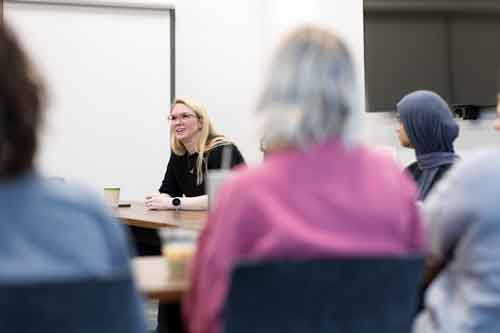Sports and fairness
JESSICA LUTHER LOVES SPORTS — which is one reason she wants sports media to do better.
Luther, a columnist and investigative journalist, spoke about sports media and social justice in February as the second scholar for the Roger Brown Residency in Social Justice, Writing and Sport.
Luther shared photos of herself as a cute grade school soccer player and an awkward member of the middle school basketball team. “I was raised a rabid sports fan,” she told students while admitting she applied to only one college — Florida State University — so she could go to football games.

Since then, the historian-turned-author has covered some of the largest stories in college sports involving gendered violence, including, in 2016, Baylor University’s response to reports of sexual violence by its football players.
She’s also become a teller of stories of women’s sports, from the rise of Black gymnasts to a traveling team of baseball-playing girls.
While at UD, she had conversations with dozens of students in classes from sport science to gender studies to sports writing.
Students wanted to know how well women are represented in the sports media. (Answer: Not well. Recent reports give the industry an F for female representation, with only 15% of sports reporters being women; the statistics are worse for women of color.) They wanted to know how a journalist knows sources are being honest. (Answer: It’s hard. “I don’t know what they didn’t tell us,” she said of Baylor.) They asked about trends in covering women’s sports. (Answer: It’s the next frontier as outlets scramble to create content — and make money.)
In a lunchtime session with student-athletes, a member of the softball team brought up the question of inequity and justice.
It was an opportunity to discuss the late Roger Brown, a former UD student-athlete. In 1961, Brown was caught up in a national gambling scandal, and was dismissed from the University and barred from playing basketball in the NCAA and NBA, despite never being charged or having any involvement in fixing games. Overcoming the injustices, Brown eventually had a standout career in the American Basketball Association with the Indiana Pacers.
“What happens in sporting spaces is of- ten a microcosm of a dynamic found in our wider culture,” Luther said before her visit. “So, to investigate and think about how social justice works in sport is to better understand our greater world.”
At her keynote address, Luther said she believes journalism and fairness, when held together, allow us to imagine the possibility of more fairness in sports.
“I think a fairer sports media landscape would be more diverse; would make sure to tell stories from all sorts of angles; would constantly remind itself that all the people we are writing about are, in fact, people; and would never forget that sports can harm as much as they can inspire if we leave power and money unchecked and unquestioned.”